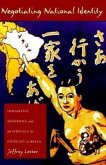"A sophisticated and thoughtful analysis of mid-twentieth-century cultural politics, recognizing both the fundamental changes that took place as Afro-Bahian cultural politics became incorporated into representations of Bahia and the limited material gains for Afro-Bahians during this period."--Hendrik Kraay, editor of Negotiating Identities in Modern Latin America > In African-Brazilian Culture and Regional Identity in Bahia, Brazil, Scott Ickes examines how in the middle of the twentieth century, African-Bahian cultural practices such as capoeira, samba, and Candomblé during carnival and other popular religious festivals came to be accepted as essential components of Bahian regional identity. Previously, public performances of traditionally African-Bahian practices were repressed in favor of more European traditions and a more "modern" vision. Newfound acceptance of these customs was a democratic move forward, but it also perpetuated the political and economic marginalization of the black majority. Ickes argues that cultural-political alliances between African-Bahian cultural practitioners and their dominant-class allies nevertheless helped to create a meaningful framework through which African-Bahian inclusion could be negotiated--a framework that is also important in the larger discussions of race and regional and national identity throughout Brazil.
Hinweis: Dieser Artikel kann nur an eine deutsche Lieferadresse ausgeliefert werden.
Hinweis: Dieser Artikel kann nur an eine deutsche Lieferadresse ausgeliefert werden.








